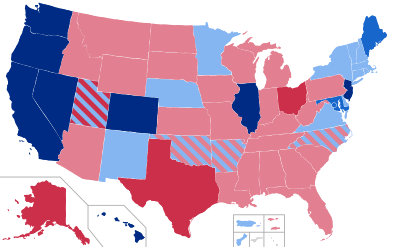

| Part of the LGBT rights series |
|
|
This article summarizes the same-sex marriage laws of states in the United States. Via the case Obergefell v. Hodges on June 26, 2015, the Supreme Court of the United States legalized same-sex marriage in a decision that applies nationwide, with the possible exception of American Samoa and some Tribal Nations. Same-sex marriages are currently licensed and recognized in all U.S. states, District of Columbia, territories, excepting the aforementioned American Samoa and some Native American tribal nations.
States
Federal districts
District of Columbia
| Ban declared unconstitutional? | Legalized by state? |
|---|---|
| — | Yes |
§ 46-401 Equal access to marriage.
(a) Marriage is the legally recognized union of 2 persons. Any person may enter into a marriage in the District of Columbia with another person, regardless of gender, unless the marriage is expressly prohibited by § 46- 401.01 or § 46-403.
(b) Where necessary to implement the rights and responsibilities relating to the marital relationship or familial relationships, gender-specific terms shall be construed to be gender neutral for all purposes throughout the law, whether in the context of statute, administrative or court rule, policy, common law, or any other source of civil law.
Unincorporated territories
American Samoa
| Ban declared unconstitutional? | Legalized by state? |
|---|---|
| No | No |
Guam
| Ban declared unconstitutional? | Legalized by state? |
|---|---|
| Yes | Yes |
Chapter 3: The contract of marriage
Marriage means the legal union between two persons without regard to gender.
Puerto Rico
| Ban declared unconstitutional? | Legalized by state? |
|---|---|
| Yes | No |
Texts:
- Puerto Rico Civil Code – Title 31 Civil Code – Subtitle 1 Persons – Part III Marriage – Chapter 29 Nature of Marriage
§ 221. Definition, validity, and dissolution of marriage. Marriage is a civil institution, originating in a civil contract whereby a man and a woman mutually agree to become husband and wife and to discharge toward each other the duties imposed by law. It is valid only when contracted and solemnized in accordance with the provisions of law, and it may be dissolved before the death of either spouse only in the cases expressly provided for in this title. Any marriage between persons of the same sex or transsexuals contracted in other jurisdictions shall not be valid or given juridical recognition in Puerto Rico.
Northern Mariana Islands
| Ban declared unconstitutional? | Legalized by state? |
|---|---|
| Yes | Yes |
U.S. Virgin Islands
| Ban declared unconstitutional? | Legalized by state? |
|---|---|
| Yes | No |
Texts:
- Virgin Islands Code – Title 16 V.I.C. (2013) Marriage
§ 31. Nature of marriage. Marriage is hereby declared to be a civil contract which may be entered into between a male and a female in accordance with law.